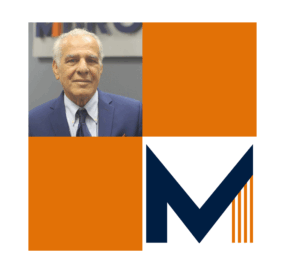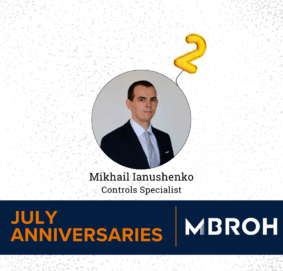
Join Mbroh Engineering as We Celebrate e-Week 2023
This week, we are celebrating e-Week and how engineers make a difference in the world. Keep reading for a Q&A with some our engineering team members who share about their journeys into engineering and some of their most memorable projects in the industry.
Matt Koller, PE, Engineering Manager

Why did you pursue engineering?
“I come from a family full of contractors and farmers. While growing up, I got to experience some of those trades first hand. I learned quickly not to pursue those types of careers. I had the opportunity to choose my career, so I chose engineering. Especially after hearing my contractor family members speak so “highly” of engineers!”
How do you feel engineers make a difference?
“Engineers work with clients to design projects in the most efficient and economical way, while at the same time, providing the public that what is designed and ultimately built will be safe and livable in their communities.”
———————————————————————————————
Alex Nizov, PE, Vice President

Why did you pursue engineering?
“My family-grandfather, mother, father, uncles-all were engineers. Me and my brother were destined to be engineers.”
What is the most memorable project/experience you’ve had during your career?
“One of the most memorable was the New Electrical Distribution System for Ina Road WWTP in Tucson, Arizona. It was a very large WWTP located in the desert with no power access from power companies, so the entire plant needed to be designed and energized from 12 large primary power generators system. This was a very complicated electrical engineering project and one that I am very proud of.”
———————————————————————————————
Veronica Weaver-Rivers, PE, Houston Area Client Officer

Why did you pursue engineering?
“I chose engineering after spending eight years in the armed forces as a medical professional. During military service, I discovered the hospital environment wasn’t for me. By that time, I sought out the most lucrative career I could pursue without an advanced degree and discovered engineering through my research. My uncle is an electrical engineer, so I also drew inspiration and motivation from him.”
What makes engineering rewarding to you?
“I enjoy the diversity of career arcs in engineering. Because our field is so multidisciplinary, I’ve managed an array of projects across several industries and have even worked internationally. I’m most rewarded by the freedom to explore new roles and opportunities that engineering makes possible.”
What is the most memorable project/experience you’ve had during your career?
“I really enjoyed working in Japan – learning Japanese and using the metric system. Spending lots of time in Hawaii on my way back to the states was pretty awesome, too!”
How do you feel engineers make a difference?
“Through mentorship and being active in our communities, we can inspire others who may not have considered engineering.”
———————————————————————————————
Ashok Varma, PE, Senior Consultant

What makes engineering rewarding to you?
“From my early days as an engineer, I was lucky to get thrown into the heavy duty design of facilities, pump stations, and the like. The most gratifying part of my engineering experience has been to see an idea created on a piece of paper to being a built and working piece of equipment or structure that delivers the desired result.”
What is the most memorable project/experience you’ve had during your career?
“One of my first assignments out of college was to evaluate a large and critical pump-motor selection that the client was purchasing. My senior management asked me to do the evaluation since I was a mechanical engineer. There were no senior engineers to advise me, so I had to rely heavily on my courses in undergraduate and graduate school, worked late nights and weekends to fully understand the construction of the pump and eventually reached a selection based on shaft deflection and thin-film theory. It was gratifying to see the client accept my conclusions. The reason this sticks in my mind is that I had to learn on the job, evaluate critical equipment, and it gave me the confidence to tackle problems that did not have an obvious solution.”


